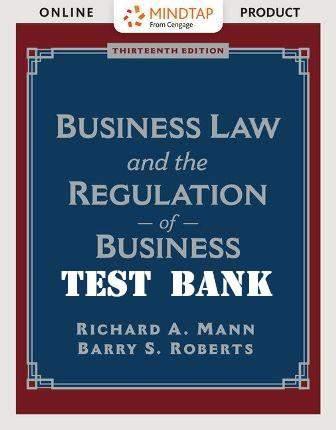
Indicate whether the statement is true or false.
1. The law does not change; it is based on unchanging and universal truths.
a. True
b. False
2. William Blackstone, an English jurist, defined law as “a rule of civil conduct prescribed by the supreme power in a state, commanding what is right, and prohibiting what is wrong.”
a. True
b. False
3. A judge deciding a common law case must look for guidance to similar cases previously decided by that court or superior courts.
a. True
b. False
4. In the United States, treaties are not subject to judicial review.
a. True
b. False
5. The primary function of the law is to allow flexibility and adaptability in the social, political, and economic system of a society.
a. True
b. False
6. Assume the state of Texas has been negotiating with the Mexican government on issues involving acid rain and eventually reaches an agreement with Mexican officials to regulate industrial pollution that contributes to acid rain in return for Texas regulating cattle waste that contributes to water table pollution. This is a valid treaty under the United States Constitution.
a. True
b. False
7. Since the end of the nineteenth century, case law developed from court opinions has been the primary source of new law and ordered social change in the United States.
a. True
b. False
8. The common law system is used in most of Europe, Asia, and South America.
a. True
b. False
9. The burden of proof required in a criminal case is preponderance of the evidence.
a. True
b. False
10. The principle of judicial review divides the government into three distinct and independent branches: judicial, executive, and legislative.
a. True
b. False
11. The Uniform Commercial Code is a federal law that applies to commercial transactions among the states.
a. True
b. False
12. Law is an instrument intended to achieve and maintain social control.
a. True
b. False
13. All laws are derived from morals, but some moral precepts are not enforced by legal sanctions.
a. True
b. False
14. A constitution restricts the powers of the government and specifies the rights and liberties of the people.
a. True
b. False
15. The American Law Institute has authored an orderly restatement of the general common law of the United States called the Restatement of law.
a. True
b. False
16. The principle of stare decisis gives stability to our system of jurisprudence because it encourages consistent decisions for similar cases.
a. True
b. False
17. The US Constitution provides that federal statutes supercede provisions of state constitutions and state statutes.
a. True
b. False
18. Civil law systems, as found in the state of Louisiana and countries such as Scotland, depend on comprehensive legislative enactments.
a. True
b. False
19. Business law is primarily private law.
a. True
b. False
20. The common law system of law uses the inquisitorial system of settling disputes.
a. True
b. False
CLICK THE LINK BELOW TO ACCESS THIS PAPER
https://www.leakedexams.com/item/66861/test-bank-business-law-and-theregulation-of-business-by-richard-amann-barrys-roberts
